
HVAC Repair Explained: Common Issues and Solutions
November 6, 2025

Your Guide to a Comfortable Home
Heating and cooling repair keeps your home comfortable when your HVAC system stops working. Most homeowners face repair needs, whether it's a furnace that won't ignite or an AC that blows warm air during a Texas summer.
Quick Answer: When to Call for Heating and Cooling Repair
- Strange noises - Banging, grinding, or squealing sounds
- Weak airflow - Rooms that won't heat or cool properly
- Rising energy bills - Sudden increases without changing usage
- System cycling - Turning on and off too frequently
- Bad smells - Musty, burning, or electrical odors
- Water leaks - Pooling around your indoor or outdoor unit
- Thermostat issues - Temperature doesn't match your settings
Most HVAC problems start small, like a dirty filter restricting airflow or a worn belt squealing. When ignored, these minor issues can become major headaches. The good news is that many common problems have straightforward solutions when caught early. Regular maintenance prevents most breakdowns, and professional technicians can diagnose issues quickly.
Understanding what goes wrong with heating and cooling systems helps you make smart decisions. This guide walks you through everything Texas homeowners need to know about HVAC repair, from spotting warning signs to working with qualified professionals.
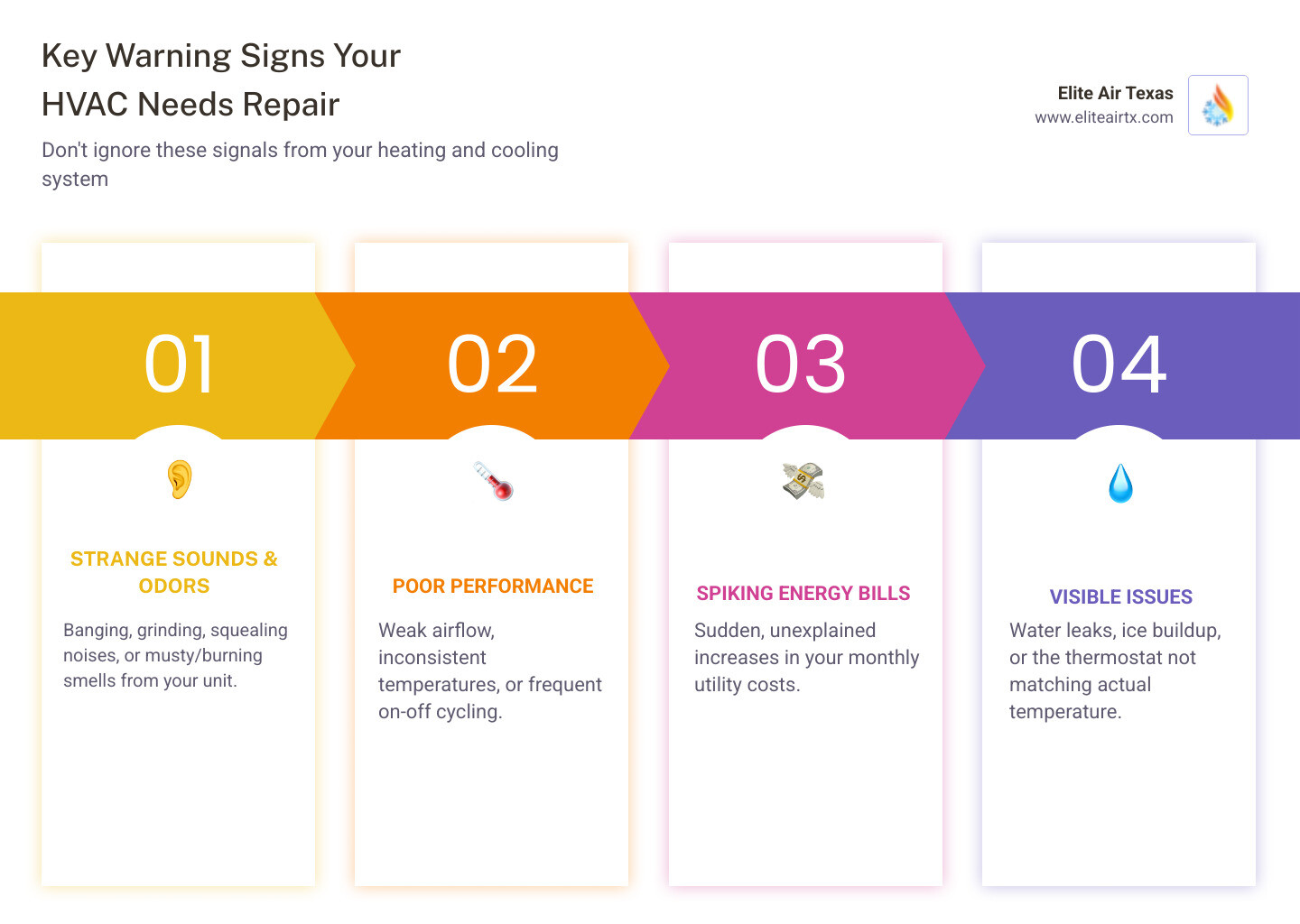
Heating and cooling repair glossary:
Telltale Signs Your HVAC System Needs Repair
Your HVAC system often gives warning signs before a crisis. Learning to recognize these signs can help you avoid an expensive emergency, like a furnace failing during a Fort Worth holiday or an AC blowing warm air in the middle of an Aledo July.
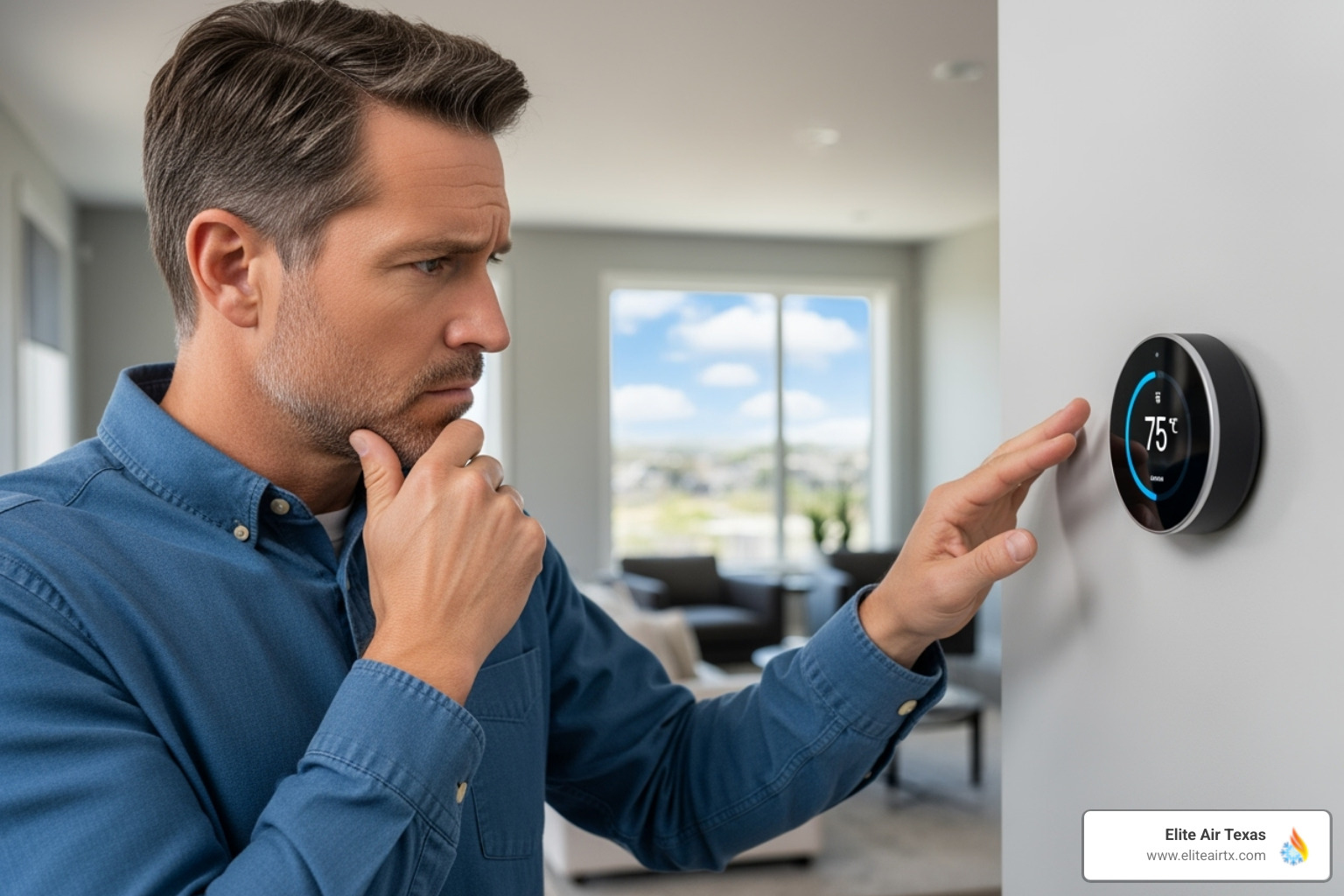
- Inconsistent temperatures: If some rooms are hot and others are cold, it could signal blocked vents, leaky ductwork, or a struggling system.
- Weak airflow: Air from your vents should feel strong. Weak flow may mean a clogged filter or a failing blower motor.
- High humidity: If your home feels sticky in the summer even with the AC on, the system isn't properly removing moisture from the air.
- Frequent cycling: A system that turns on and off in short bursts is "short cycling." This wastes energy and strains the equipment, often due to a faulty thermostat or an oversized unit.
- Water leaks: Puddles near your indoor unit could mean a clogged condensate drain, while water near a furnace can signal other serious issues.
- Ice buildup: Ice on your outdoor unit or refrigerant lines indicates a problem, such as low refrigerant or restricted airflow, that can destroy your compressor.
If you're already experiencing cooling problems, our AC Not Cooling Troubleshooting Guide can help you identify potential causes.
Strange Noises and Unusual Smells
A healthy HVAC system is quiet. New sounds or smells are a call for help.
- Banging: Suggests a loose or broken part, like a failing blower motor or a combustion problem in a furnace.
- Grinding: Means metal is scraping against metal, often from a worn-out motor bearing.
- Squealing: Typically comes from a worn fan belt or a bearing that's about to fail.
- Musty odors: Indicate mold or mildew growth in the ductwork or on the evaporator coil.
- Burning smells: If you smell burning plastic or rubber, shut down your system immediately. It points to overheating electrical components.
- Electrical odors: A sharp, acrid smell signals overheating wires and is a fire hazard.
- Gas leak signs: If you smell rotten eggs near your furnace, evacuate your home, call your gas provider, and contact emergency services. Do not use any electronics or light switches inside.
Spikes in Your Energy Bills
A sudden, unexplained spike in your utility bill often means your HVAC system is working harder than it should. This extra effort, caused by worn parts or dirty components, shows up as higher energy consumption. Compare your current bills to the same months from previous years. A gradual increase is normal with age, but a sharp jump is your system calling for help. Understanding how energy efficiency and HVAC performance relate can help you decide when to repair or replace.
Common Problems Requiring Heating and Cooling Repair
Your HVAC system is a complex machine. When one component fails—from the thermostat to the outdoor compressor—it can bring the entire system to a halt.
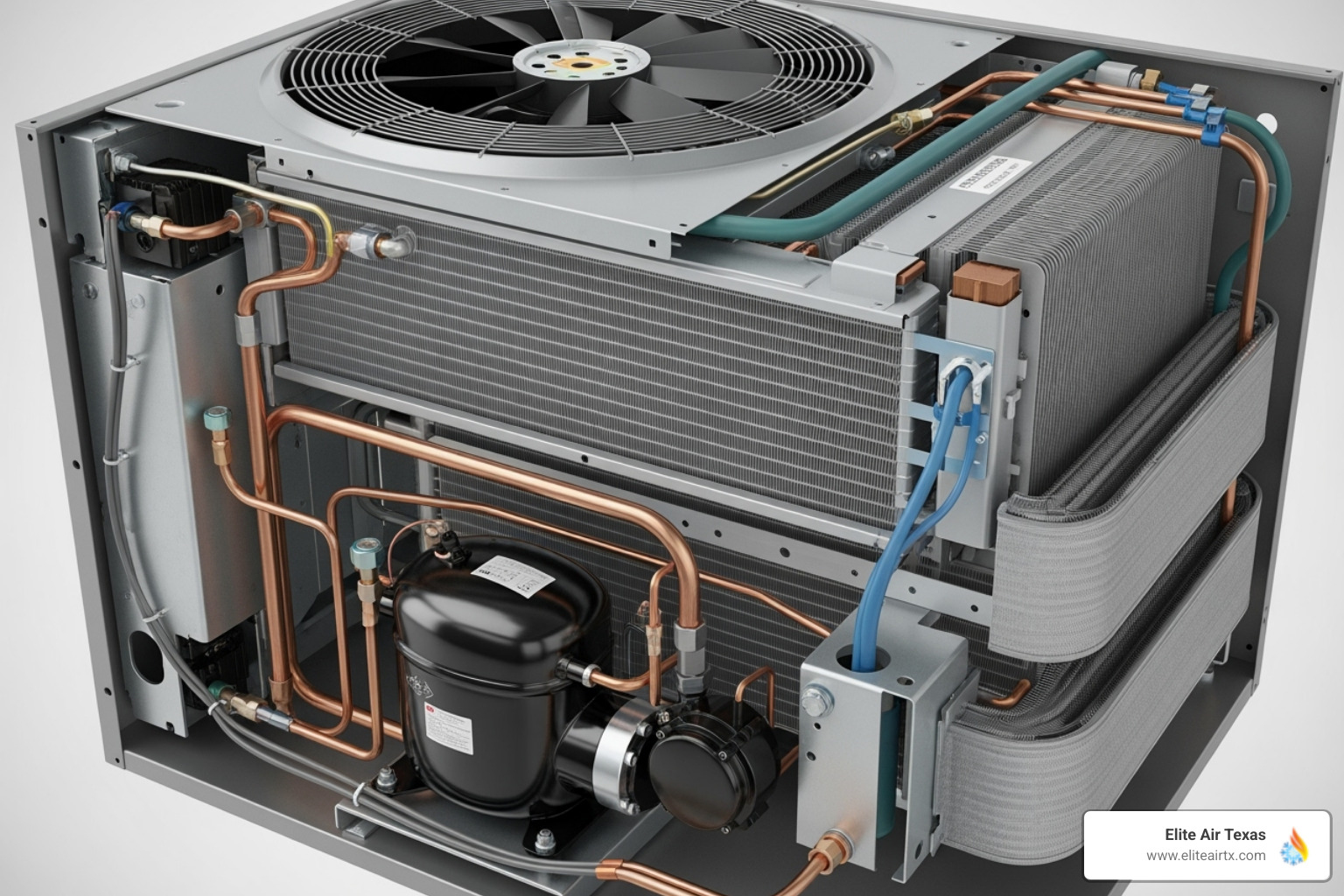
- Thermostat issues: A faulty thermostat can mimic a major system failure. Sometimes, the fix is as simple as new batteries or recalibration.
- Mechanical wear and tear: Belts, bearings, and motors wear out over time. Regular maintenance can catch these issues before they cause a breakdown.
- Electrical problems: Loose connections, frayed wires, or failed capacitors can cause the system to stop working. These issues require a professional diagnosis due to safety risks. Our HVAC Emergency Repair Ultimate Guide can help you assess urgent situations.
Cooling System Issues
In a Texas summer, a broken AC is more than an inconvenience. Here are the most common culprits.
- Refrigerant leaks: Your AC recycles refrigerant; it doesn't use it up. If levels are low, you have a leak that must be repaired. Simply adding more is only a temporary fix.
- Dirty condenser coils: The outdoor unit's coils can't release heat effectively when caked with dirt and debris. This forces the system to work harder and cool less efficiently.
- Clogged condensate drain line: In our humid climate, the drain line removes a lot of water. Algae can clog it, causing water to back up into your home and risk damage and mold.
- Fan problems: A failed outdoor fan can cause the compressor to overheat. A failed indoor blower means no cool air will circulate from your vents.
- Capacitor failure: Capacitors give motors the jolt they need to start. When one fails, you may hear a clicking sound as the system tries and fails to turn on. This is a common and relatively quick fix for a technician.
For expert AC Repair and Service, or specialized Air Conditioning Repair Dallas services, our team is ready to help.
Heating System Issues
While Texas winters are often mild, a reliable furnace is essential for freezing nights. Here are common furnace problems.
- Dirty air filters: A clogged filter is the top cause of furnace issues. It restricts airflow, causing the furnace to overheat and shut down. Change your filter every 1-3 months.
- Pilot light and ignition problems: Whether you have an old pilot light or a modern electronic ignition, a failure in this system means no heat. This involves gas and requires professional service.
- Blower motor failure: This motor pushes warm air through your home. If it fails, you may hear grinding noises, and the furnace will overheat because the heat it produces has nowhere to go.
- Limit switch malfunction: This safety device prevents overheating. If it fails, it may shut your furnace off even when it's working correctly.
- Cracked heat exchanger: This is the most serious furnace problem. A crack can leak deadly carbon monoxide into your home. If you see soot, smell strong chemical odors, or notice a yellow burner flame, turn off your furnace and call for emergency service immediately.
Schedule a professional Heating System Check before winter. Fort Worth residents can rely on our dedicated Heating Repair Fort Worth services.
The Big Decision: Repair or Replace Your HVAC System?
When faced with a repair bill, you have to ask: repair or replace? The right choice depends on your system's age, the nature of the problem, and your budget. Think of it like an old car—at some point, investing in a new one becomes more sensible than another costly repair.
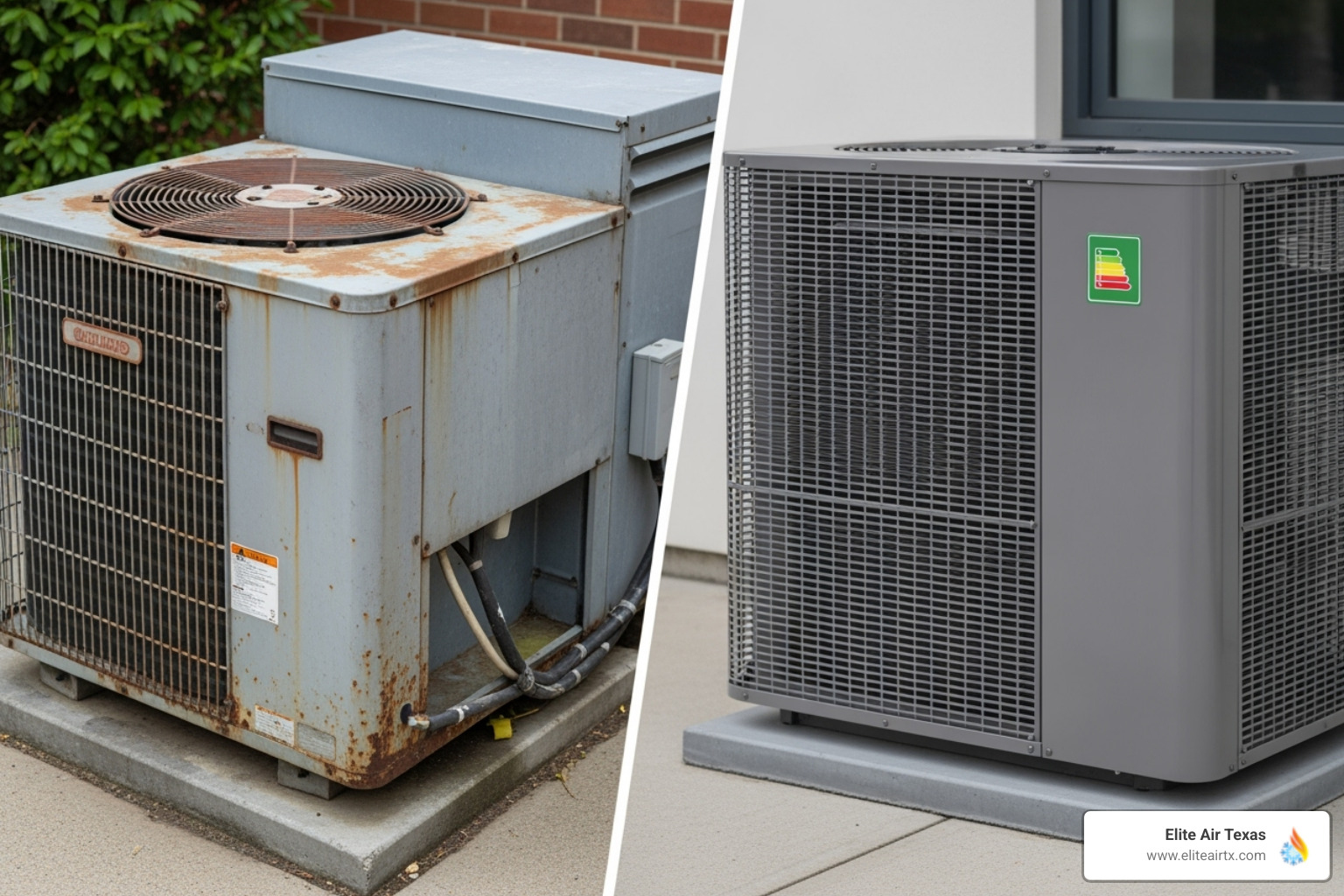
Several factors can guide your decision:
- System Age: Most ACs last 10-12 years, and furnaces 10-15 years. Repairs make more sense on younger systems.
- Repair Frequency: If you're calling for service every few months, those costs add up. It may be time to stop patching an old system.
- The 50% Rule: If a repair costs more than half the price of a new system and your unit is over 10 years old, replacement is often the better financial choice.
- Energy Efficiency: Modern systems have much higher SEER (for ACs) and AFUE (for furnaces) ratings, which translates to lower monthly utility bills.
- New Technology: Today's systems offer features like smart thermostat integration and zoning for improved comfort and convenience.
When to Choose Repair
Heating and cooling repair is often the best choice if:
- Your system is under 10 years old and has years of service left.
- The issue is a minor component failure, like a capacitor or sensor. This is like replacing brake pads on a car—a normal part of its lifespan.
- It's a one-time issue in an otherwise reliable system.
- You need a cost-effective solution now to buy time to plan for a future replacement.
Our team provides honest assessments and will never push for replacement when a simple repair makes sense. Learn more about our approach to Heating and AC Repair.
When to Consider Replacement
Replacement becomes the smarter option when:
- Your system is over 15 years old and becoming unreliable.
- You're facing frequent breakdowns and rising repair bills.
- A major component has failed, such as the compressor or heat exchanger, leading to a very expensive repair.
- Your energy costs are steadily rising as the system loses efficiency.
- You want the higher efficiency and modern features of a new system, which can provide significant long-term savings and improved comfort.
Finding and Working with a Professional HVAC Service
When your HVAC system fails, choosing the right technician is crucial. You're trusting them with your home's comfort and safety, so finding a professional for heating and cooling repair is a decision that matters.
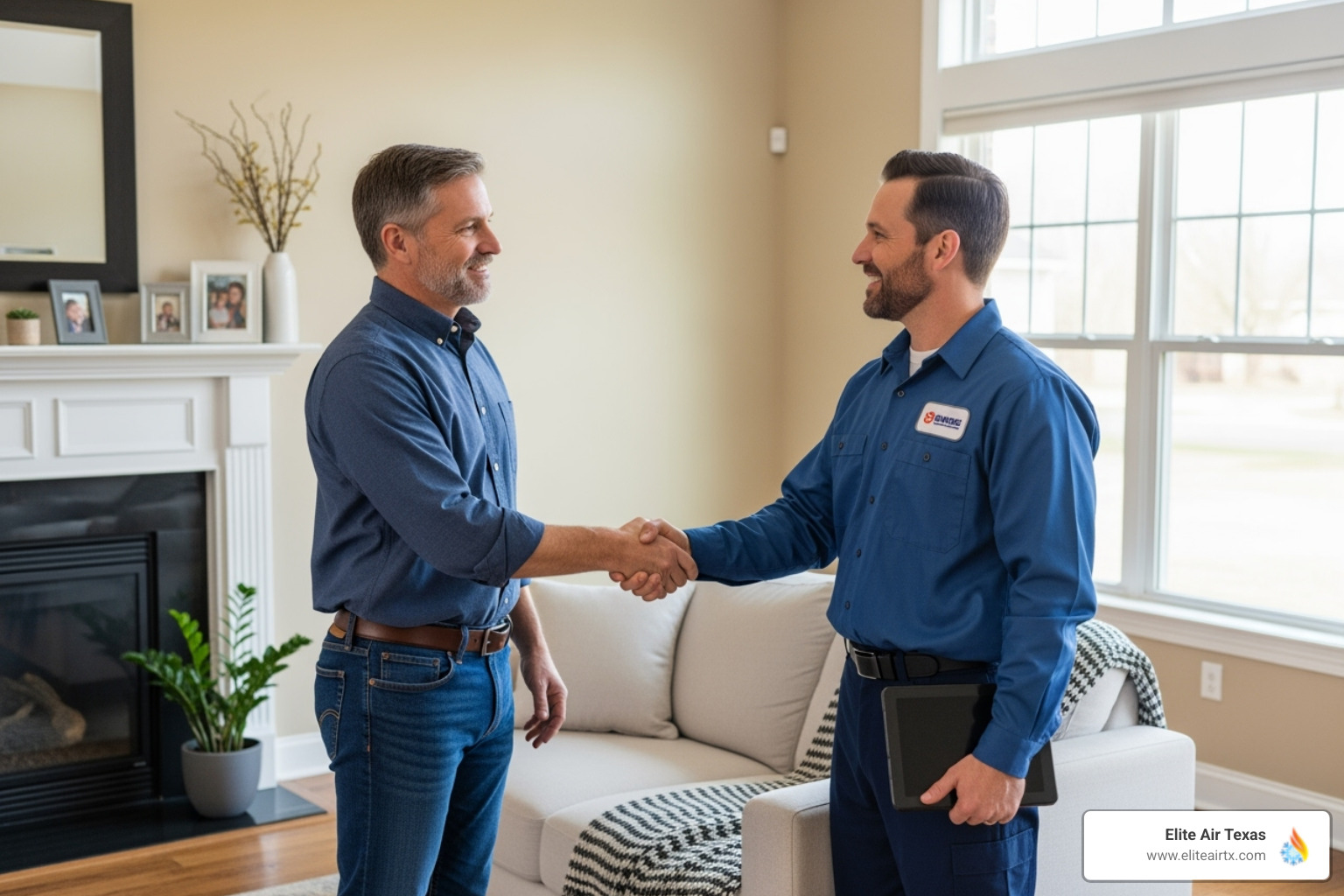
How to Choose the Right Heating and Cooling Repair Company
A great HVAC company offers more than just technical skill. They provide peace of mind through proven experience and customer focus.
- Local Experience: A company familiar with the Texas climate understands the strain on local systems. They know regional codes and can source parts quickly.
- Reputation: Check online reviews on Google or the Better Business Bureau. Consistent positive feedback is a sign of reliable service.
- Licensing and Insurance: This is non-negotiable. A license proves their knowledge, and insurance protects you from liability. Reputable companies use licensed, background-checked technicians.
- Guarantees and Warranties: Look for companies that stand behind their work. At Elite Air Texas, we offer a 10-year labor warranty and free second opinions because we are confident in our service.
- NATE Certification: While not required, North American Technician Excellence (NATE) certification shows a technician has advanced, up-to-date training.
- Transparency: A good company provides clear explanations and written estimates before work begins. You should feel informed, not confused.
You can find qualified professionals using resources like the ACCA HVAC Contractor Locator. For homeowners in Fort Worth, we offer expert HVAC Repair Fort Worth services.
Questions to Ask Your Technician
A good technician welcomes questions. Be an active partner in solving the problem.
- Can you explain the problem in simple terms? You deserve to understand what's wrong.
- Will I receive a written estimate before you start? This prevents surprise charges and details all costs.
- What warranties apply to the parts and labor? Know what's covered and for how long.
- What are your qualifications? Ask about certifications or manufacturer-specific training.
- How can I prevent this from happening again? A pro can offer valuable maintenance advice.
- What is the timeline for the repair? Knowing the schedule helps you plan your day.
The right company treats your home with respect, arrives on time, and ensures you're satisfied. That's the standard we uphold at Elite Air Texas.
The Power of Prevention: How Maintenance Saves You Money
Many homeowners only call for HVAC service when something breaks, but this reactive approach is often more expensive. Regular maintenance is the key to avoiding costly heating and cooling repair emergencies.
A professional tune-up—ideally in the spring for your AC and fall for your furnace—is a health checkup for your system. This preventative care delivers significant benefits:
- Prevents Breakdowns: Technicians catch and fix small issues, like a worn belt or dirty coil, before they cause a system failure.
- Extends Lifespan: Clean, lubricated, and properly adjusted components wear out slower, adding years to your equipment's life.
- Improves Efficiency: A well-maintained system runs more smoothly and uses less energy, which lowers your monthly utility bills.
- Ensures Safety: Inspections include checking for electrical faults or potential carbon monoxide leaks, protecting your family.
Key maintenance tasks include regular filter changes (every 1-3 months) to ensure proper airflow and professional coil cleaning to allow for efficient heat transfer. A little preventive care now saves you from major repair bills later. Homeowners in Arlington can keep their systems running smoothly with our Heating Repair Arlington services and maintenance plans.
Frequently Asked Questions about HVAC Repair
You've likely got questions swirling around in your mind about heating and cooling repair, and that's completely natural. We want to make sure you have the information you need to feel confident about caring for your home's comfort system.
How often should I have my HVAC system serviced?
We recommend professional service at least once a year, but twice a year is ideal for peak performance. Schedule an AC tune-up in the spring and a heating system check-up in the fall. This ensures each system is ready for its peak season. These visits prevent major breakdowns by catching small issues early and are often required to keep your manufacturer's warranty valid.
Can I perform any HVAC repairs myself?
Some basic tasks are perfect for DIY. Every homeowner should change the air filter every 1-3 months, keep the area around the outdoor unit clear of debris, and ensure indoor vents aren't blocked.
However, complex repairs should always be left to a licensed professional. HVAC systems involve high-voltage electricity, pressurized refrigerants, and natural gas lines. Attempting a repair without proper training and tools is dangerous and can lead to injury, further damage, or a voided warranty. It's safer and more effective to call a pro.
What is considered an HVAC emergency?
An HVAC emergency is any situation that threatens your health and safety or makes your home unlivable. Call for immediate help if you experience:
- No heat during freezing weather.
- No air conditioning during extreme heat.
- A gas smell (rotten eggs) near your furnace. Evacuate immediately and call your gas company and emergency services.
- Electrical issues like smoke, sparks, or burning smells from your unit.
- Major water leaks from your system.
- Your carbon monoxide detector goes off.
For these critical situations in the Aledo area, our HVAC emergency repair services are designed to respond quickly when you need us most. We understand that emergencies don't wait for convenient times, and neither should your solution.
Keep Your Home Comfortable Year-Round
Your home should be a comfortable sanctuary, regardless of the weather outside. A reliable HVAC system is key to that peace of mind, and prompt, professional heating and cooling repair ensures it stays that way.
This guide has covered the warning signs of a failing system, common problems, and the choice between repair and replacement. Most importantly, it has highlighted how regular maintenance is the best way to prevent breakdowns.
For homeowners throughout Aledo, Fort Worth, Dallas, Arlington, Azle, Benbrook, Boyd, Cresson, Decatur, Granbury, Haltom City, Hudson Oaks, Lake Worth, Mineral Wells, North Richland Hills, Poolville, River Oaks, Saginaw, Springtown, Weatherford, White Settlement, and Willow Park, Elite Air Texas is ready to provide expert diagnostics and reliable repairs. We don't just fix equipment; we restore your comfort.
Our promise is affordable comfort paired with elite service. We prove it with free second opinions, a 10-year labor warranty, and significant savings on new equipment as a Platinum Vendor.
Don't wait for a small problem to become an emergency. Whether you need maintenance, a repair, or expert advice, we're here to help. Get expert AC repair in Fort Worth, TX and experience what professional HVAC service should feel like.
Ready to Enhance Your Comfort?
Contact our experts today to discover tailored HVAC solutions that fit your needs perfectly.


%201.svg)

